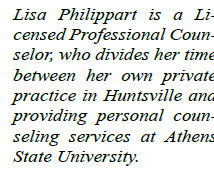 By: Lisa Philippart
By: Lisa Philippart
Over the years, I have had many clients tell me that they dread this time of year. For those struggling with a mental illness, particularly anxiety or depression, Christmas stirs up extreme emotions that many are forced to relive year after year. Even if you just find the holidays stressful, I have some suggestions for what you can do to not only survive the next few weeks, but maybe even return to feelings of joy during this season.
Let’s begin by looking at your particular pressure points. Are you someone who surrenders to sweets and rich foods? Do you fret yourself into an anxiety spiral because you can’t afford to buy everything for everybody on your list? Do you pull away from others and isolate because of the emphasis on family togetherness? Once you have identified your triggers, you can focus on finding some specific problem solving techniques. Find someone you trust to share your concerns who may be able to help brainstorm positive measures to manage the challenge.
 “We are what we eat.” And this is never truer than during the holidays. Your diet can either improve or aggravate your mood. I know you will be tempted over and over again, testing your will power and commitment to moderation. Take a few moments to answer this question, “What can I do to stay healthy during the holidays?” Then, make a list of specific and realistic goals on one side of the page, and challenges (what typically derails you) on the other side. Track your frustrations and achievements daily, especially if you are prone to overthinking or negative self-talk. And it never hurts to give yourself small rewards along the way. Next, make a list of all the things you THINK need to be done, including shopping, parties, volunteer activities, family visits, etc. Then, take a calendar and pencil in a schedule of when these things need to happen. Now here is the important part: Think hard about what is really central to your celebrations. To protect your wellbeing, you may have to make some difficult choices about traditional activities. For example, does reducing the emotional strain of traveling to visit family outweigh the potential hurt feelings and arguments?
“We are what we eat.” And this is never truer than during the holidays. Your diet can either improve or aggravate your mood. I know you will be tempted over and over again, testing your will power and commitment to moderation. Take a few moments to answer this question, “What can I do to stay healthy during the holidays?” Then, make a list of specific and realistic goals on one side of the page, and challenges (what typically derails you) on the other side. Track your frustrations and achievements daily, especially if you are prone to overthinking or negative self-talk. And it never hurts to give yourself small rewards along the way. Next, make a list of all the things you THINK need to be done, including shopping, parties, volunteer activities, family visits, etc. Then, take a calendar and pencil in a schedule of when these things need to happen. Now here is the important part: Think hard about what is really central to your celebrations. To protect your wellbeing, you may have to make some difficult choices about traditional activities. For example, does reducing the emotional strain of traveling to visit family outweigh the potential hurt feelings and arguments?
 Let’s be honest. You, yourself, can’t do it all. It’s okay to divide up some of the tasks among family members. Maybe the family party that you always host could be potluck this year? Remember last year when you didn’t think you would get everything done? Take a breath and have faith in yourself to do the best you can. As with most things in life, attitude is everything. Take a moment to tweak your outlook. You may be placing unrealistic expectations on yourself and others, which can only lead to disappointment and conflict. There is always that relative or friend who sets you off, but wishing they would change will go nowhere. You can only control how you think, feel, and act, not how others treat you. So, let’s be less self-critical because the house isn’t spotless and more grateful for the company. I know you have heard it before, but an attitude of gratitude has benefits both mentally and physically. If you do find yourself slipping into the fog of anxiety or depression, remind yourself that you are human and that this time too will pass.
Let’s be honest. You, yourself, can’t do it all. It’s okay to divide up some of the tasks among family members. Maybe the family party that you always host could be potluck this year? Remember last year when you didn’t think you would get everything done? Take a breath and have faith in yourself to do the best you can. As with most things in life, attitude is everything. Take a moment to tweak your outlook. You may be placing unrealistic expectations on yourself and others, which can only lead to disappointment and conflict. There is always that relative or friend who sets you off, but wishing they would change will go nowhere. You can only control how you think, feel, and act, not how others treat you. So, let’s be less self-critical because the house isn’t spotless and more grateful for the company. I know you have heard it before, but an attitude of gratitude has benefits both mentally and physically. If you do find yourself slipping into the fog of anxiety or depression, remind yourself that you are human and that this time too will pass.
By: Lisa Philippart
Licensed Professional Counselor







